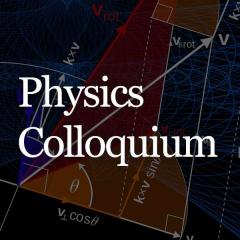Prof. Achim Kempf, Perimeter Institute for Theoretical Physics "Stone age tools for Quantum Gravity?" 15/03/2019 11:00am
On Friday 15th March 2019, Physics Colloquium will be hosting Prof. Achim Kempf (Professor at University of Waterloo Canada & co-Chair at International Society for Relativisitc Quantum Information) discussing on prospective new methods to study the domain of cosmology, relativity and quantum theory. Following is the abstract of his talk.
Abstract. Relativity and quantum theory each required the abandoning of basic but ultimately incorrect concepts that had previously been considered self evident. Today, the fact that it is so tremendously difficult to develop quantum gravity may indicate that it will again be necessary to abandon some basic concepts, presumably concepts that seem self-evident, that sit deep and go a long way back. The difficulty is, of course, to know which concepts to abandon. How deep will we have to dig or how far back in time will we have to search for the origins of the misconceptions that may need to be overcome? I suggest we go all the way back to the stone age and question, for example, the notion of distance, as measured by measuring sticks and the like. I will argue that it is possible and may be useful for quantum gravity to replace the very notion of spacetime distance by the notion of the correlation strength of vacuum fluctuations.
Bio. Prof. Kempf was an undergraduate at the University of Heidelberg (Germany’s oldest), and he obtained his Ph.D. from the University of Munich. He was a postdoc and a College Research Fellow (Corpus) at the Department of Applied Mathematics and Theoretical Physics (DAMTP) at Cambridge and a postdoc at the Institute for Fundamental Theory at University of Florida. He has been Canada Research Chair, for the Physics of Information for 10 years, he holds a University Research Chair and he is currently co-chair of the International Societry for Relativistic Quantum Information. He’s also an associate member of the IQC.
About Physics colloquium
The Physics Colloquium series hosts a range of speakers from Australia and abroad. The series explores a variety of topics and everyone is welcome to come along. The seminars are open so there is no need to register your attendance.
If you would like to sign up for colloquium announcement emails, you can join the mailing list by sending a blank email to:
- For UQ email addresses: physics-colloquium-others-join@lists.science.uq.edu.au
- For non-UQ email addresses: physics-announce-external-join@lists.science.uq.edu.au
(Note: if you receive physics-all emails, you should already receive these and don't need to sign up again).

